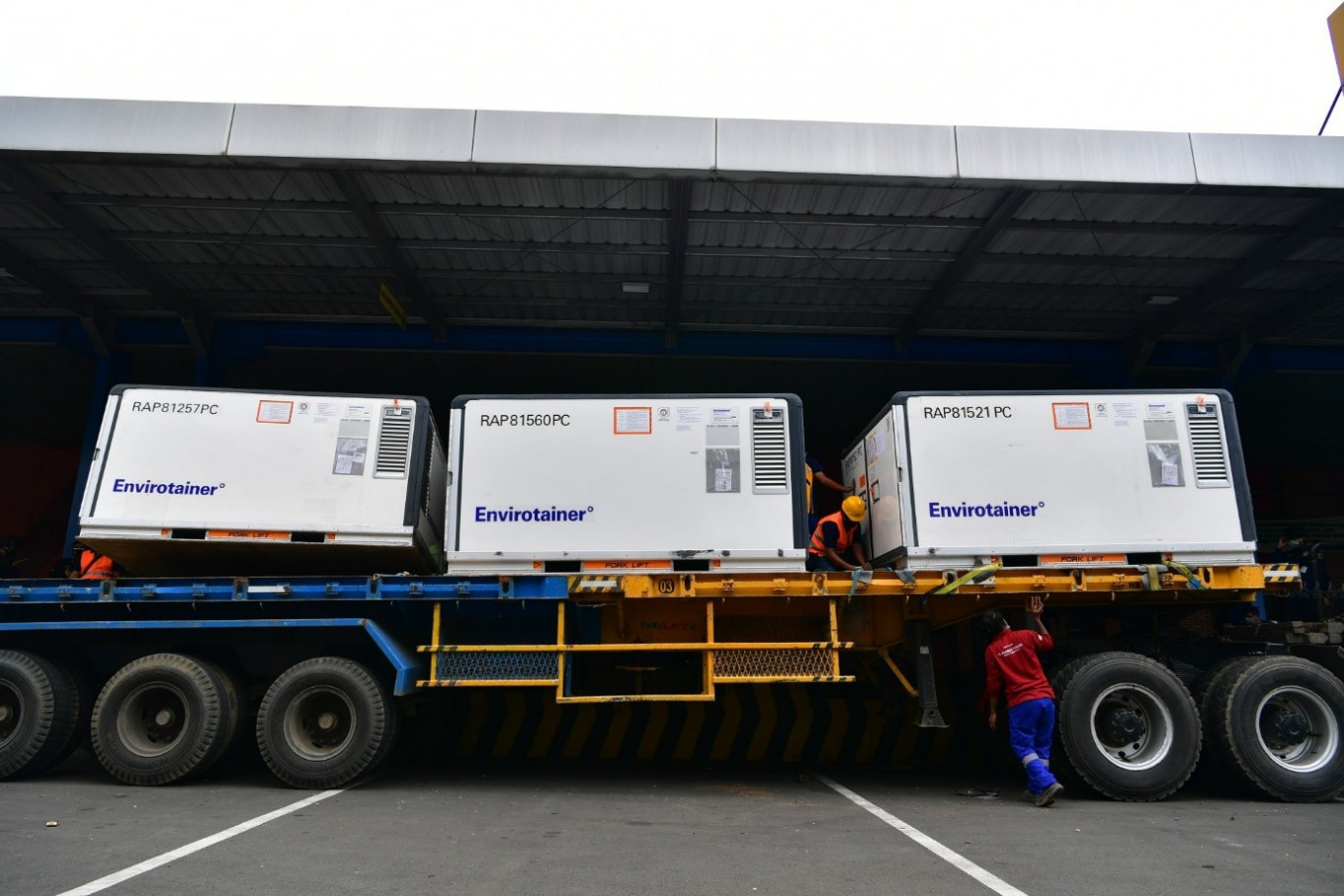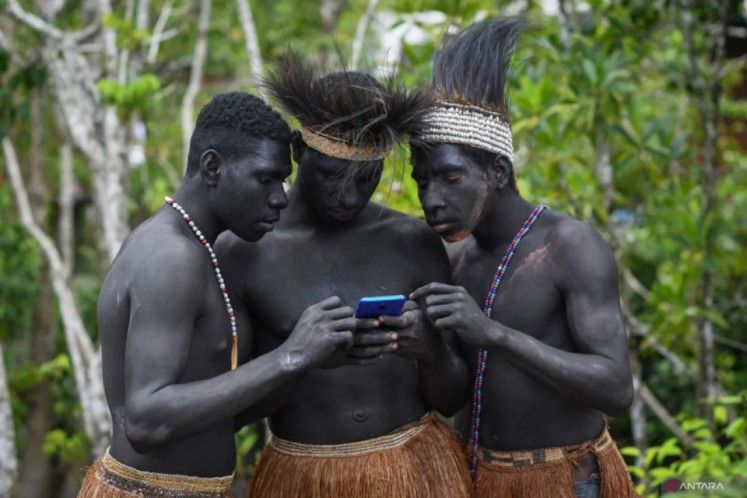Popular Reads
Top Results
Can't find what you're looking for?
View all search resultsPopular Reads
Top Results
Can't find what you're looking for?
View all search resultsChina’s soft power success story in Indonesia: Vaccines and Uyghur Muslims
As of October 2021, Indonesia has imported 278.5 million doses of vaccines from China, including in bulk, which were later processed by state-owned pharma PT Bio Farma in Bandung, West Java.
Change text size
Gift Premium Articles
to Anyone
 Ready to go: Indonesia’s 18th batch of vaccines, comprising 14 million Sinovac doses, arrives at Soekarno-Hatta International Airport on June 30, 2021. The vaccines, which were stored in special containers called envirotainers, were then transported to PT Bio Farma facilities in Bandung for further processing. (Courtesy of KPC PEN)
Ready to go: Indonesia’s 18th batch of vaccines, comprising 14 million Sinovac doses, arrives at Soekarno-Hatta International Airport on June 30, 2021. The vaccines, which were stored in special containers called envirotainers, were then transported to PT Bio Farma facilities in Bandung for further processing. (Courtesy of KPC PEN)
W
hen I read the full text of the policy speech made by Chinese Foreign Minister Wang Yi on Monday, in which he highly praised the achievements of his country and ASEAN, I immediately remembered Joseph Samuel Nye Jr's concept of soft power, which he introduced in the late 1980s. The Harvard University professor’s explanation may be helpful to understand why China continues to face serious challenges in convincing the international community about its soft approach.
China is the most important trading partner of not just ASEAN but also many countries across the globe. But at the same time, China’s image is associated with economic and military might and its assertiveness in claiming sovereignty over nearly all of the South China Sea.
As reported by Xinhua news agency, Wang highly praised the achievements of China-ASEAN cooperation and commended the two parties because they “are always good neighbors, good friends and good partners with a shared future".
He also recalled China’s provision of COVID-19 vaccines to ASEAN countries from the very early stage of the pandemic while Western countries only acted too late too little. China also supplied medical equipment such as test kits, N95 masks, protective gear and portable ventilators.
“The cooperation between China with ASEAN countries against COVID-19 was a vivid testament to the deep friendship through thick and thin,” said Wang.
China has at least two success stories from its soft power diplomacy in Indonesia in the last few years.
First, it's COVID-19 vaccine diplomacy. Indonesia was among the largest recipients of China’s vaccines, both on a commercial and donation basis, mainly produced by Sinovac. As of October 2021, Indonesia has imported 278.5 million doses of vaccines from China, including in bulk, which were later processed by state-owned pharma PT Bio Farma in Bandung,
Second, its pesantren (Islamic boarding school) diplomacy. After the success of its COVID-19 vaccine diplomacy, China also surprisingly performed impressively in its soft-power diplomacy to countervail the West’s accusations of human rights violations against the minority Uyghur Muslims in Xinjiang,
Beijing has launched massive public diplomacy by approaching Indonesia’s two largest Muslim organizations, Nahdlatul Ulama (NU) and Muhammadiyah. Pesantren students were also invited to China to visit several provinces and Islamic centers there.
In December 2019, the Wall Street Journal published a report accusing donations and other financial support have “helped to blunt criticism of its treatment of Uyghurs by Muslim-majority nations”. Both NU and Muhammadiyah categorically denied the allegations.
We need to remember that most Indonesians are staunch defenders of the Unitary State of the Republic of Indonesia (NKR) and give little sympathy to separatist movements. So, they tend to perceive the Uyghur problem as a secessionist movement, rather than an issue of freedom of religion or of Islamic solidarity.
Despite the rising trade volumes and China’s generosity in providing abundant COVID-19 vaccines to Indonesia and other countries, the public perception in ASEAN toward China tends to be negative — although the level may vary among the 10 bloc members.
Singapore's ISEAS-Yusof Ishak Institute found in its survey last year that 65.9 percent of Indonesian respondents were concerned about China’s growing economic influence. Most of the respondents were worried about China’s militarization and assertive actions, as well as its encroachment into the exclusive economic zones and continental shelves.
They are also anxious about a possible military confrontation between the United States and China. But when asked which side they would support, most respondents said they would choose the US.
According to the survey, the majority of respondents (63 percent) have either “little confidence” (37 percent) or “no confidence” (26 percent) in China to “do the right thing” to contribute to global peace, security, prosperity and governance. Interestingly, Japan is largely perceived as the most trusted power in the region.
I tried to guess what was wrong then.
Nye wrote an article this year titled “What Happened to Soft Power?” in Project Syndicate. He identifies a country’s soft power mainly from three sources: Culture, political values and policies.
“A government can influence others through the example of how it behaves at home, such as by protecting a free press and the right to protest; in international institutions, consulting others and fostering multilateralism; and through its foreign policy, such as by promoting development and human rights,” the Harvard University distinguished service professor writes.
China has repeatedly talked about peaceful and mutually beneficial relations with ASEAN but at the same time, is becoming more assertive in the South China Sea. The fact that China is closer to replacing the US as the world’s most powerful economy and later military force has scared not just its Asian neighbors but also many countries.
China has scored high on its soft-power diplomacy in Indonesia, thanks to the vaccine diplomacy and the approach to Muslim communities here. You may have different views about the changing perception of Indonesians about the development facing the Uighur people, but as the ISEAS-Yusof Ishak Institute survey has discovered, many are still afraid of China’s rise.
Indonesia is not a claimant in the South China Sea, but Beijing includes the Natuna waters in its nine-dash line, which Indonesia has rejected because it runs counter to the United Nations Convention of the Law of the Sea (UNCLOS), to which Indonesia and China are parties.
Clearly, China needs to double its efforts to change the way its neighbors here and far look at it. Soft power is proven as effective today as hard power used to be, but a combination of the two does not necessarily work.
***
The writer is a senior editor at The Jakarta Post.










